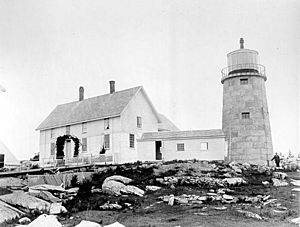Whitehead Light facts for kids
 |
|
|
|
|
| Location | Penobscot Bay entrance, Maine |
|---|---|
| Coordinates | 43°58′43.369″N 69°7′27.397″W / 43.97871361°N 69.12427694°W |
| Year first constructed | 1804 |
| Year first lit | 1852 (current structure) |
| Automated | 1982 |
| Foundation | Natural / emplaced |
| Construction | Granite |
| Tower shape | Conical |
| Markings / pattern | Natural |
| Height | 41 feet (12 m) |
| Focal height | 75 feet (23 m) |
| Original lens | 3rd order Fresnel lens, 1855 |
| Current lens | 12 inches (300 mm), 1982 |
| Range | 6 nautical miles (11 km; 6.9 mi) |
| Characteristic | Oc G 4s |
| Fog signal | HORN: 2 every 30s |
| USCG number | 1-4580 |
The Whitehead Light is a famous lighthouse located on Whitehead Island in Maine. It stands at the entrance to Penobscot Bay, helping ships find their way. This lighthouse is in the town of St. George.
The first light station here was built in 1804. This makes it one of the oldest light stations in Maine. The tall tower you see today was built in 1852. Its design is thought to be by a famous architect named Alexander Parris.
Whitehead Light Station was added to the National Register of Historic Places in 1988. Today, a non-profit group called Pine Island Camp owns the property. They offer different ways for people to visit and stay at the light station. The light itself is still working and is looked after by the United States Coast Guard.
Contents
About Whitehead Light Station
Whitehead Island is about 90 acres big. It is located off the coast of St. George. Besides the lighthouse, the island also has a former Whitehead Lifesaving Station. This station helped rescue people from shipwrecks.
Buildings at the Light Station
The light station is at the island's southeastern tip. It includes several important buildings:
- The lighthouse tower
- The keeper's house
- An oilhouse
- A fog signal building
The lighthouse tower is made from strong granite blocks. It has a sixteen-sided top where the light shines. Around the top is a metal walkway and railing. A small brick room sticks out from one side of the tower.
Next to the tower is the keeper's house. This is a wooden house with a pointed roof. It has a T-shape when viewed from above. The oilhouse is a small brick building. It has a pointed roof and an entrance on one side. The fog signal building is square and made of brick, with a sloped roof.
History of the Light
President Thomas Jefferson approved the building of the light station in 1804. It started working in 1807. This makes it the third-oldest active light station in Maine.
The current lighthouse tower was built in 1852. Its design is similar to the Monhegan Island Light. That lighthouse was definitely designed by Alexander Parris. The keeper's house was replaced in 1891. The oilhouse was also built in the same year.
A fog signal was added in 1869-1870. This was important because the area often has thick fog. In the past, covered walkways connected the main buildings. These walkways have since been removed.
The station became automated in 1982. This means machines took over the work, so a keeper no longer needed to live there. After automation, the keeper's house was closed up for a while.
Whitehead Light Today
In 1996, the Whitehead Light Station became part of the Maine Lights Program. It was given to Pine Island Camp. This non-profit group has been around for over 100 years.
Pine Island Camp spent 12 years carefully fixing up the keeper's house and a schoolhouse. They are now beautifully restored. During the summer, the light station offers special programs for adults. You can also rent the entire station for a week. The house has 7 bedrooms, each with its own bathroom. It also has three sitting rooms, a modern kitchen, and a dining room.
Lighthouse Keepers
For many years, brave people called lighthouse keepers lived and worked at Whitehead Light. Their job was to make sure the light was always shining. They also had to operate the fog signal in bad weather. This was a very important job to keep ships safe.
Many different keepers and their assistants served at Whitehead Light. One notable assistant keeper was Abbie B. Grant. She was known for keeping the light burning during a fierce storm in 1856 when her father, the head keeper, was away. She was only 16 years old at the time!
Keepers often lived with their families at the lighthouse. They faced lonely lives but played a vital role in maritime safety. The light was automated in 1982, meaning machines took over the job. This ended the era of human lighthouse keepers at Whitehead.
 | Kyle Baker |
 | Joseph Yoakum |
 | Laura Wheeler Waring |
 | Henry Ossawa Tanner |


